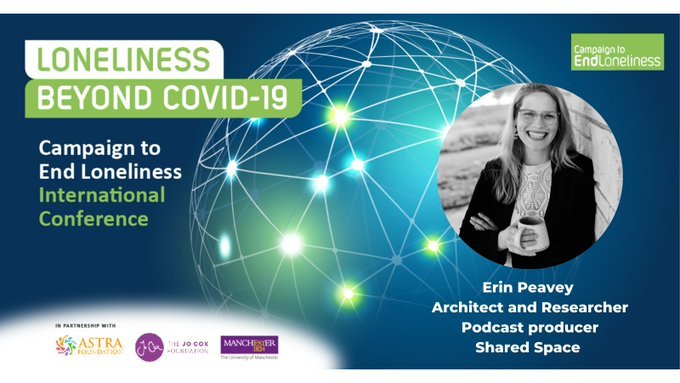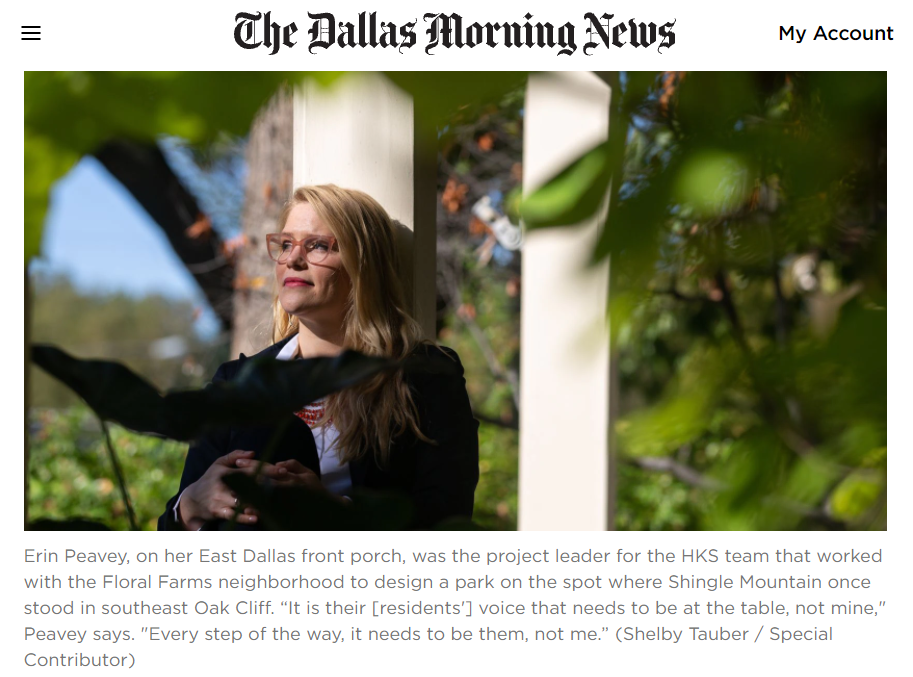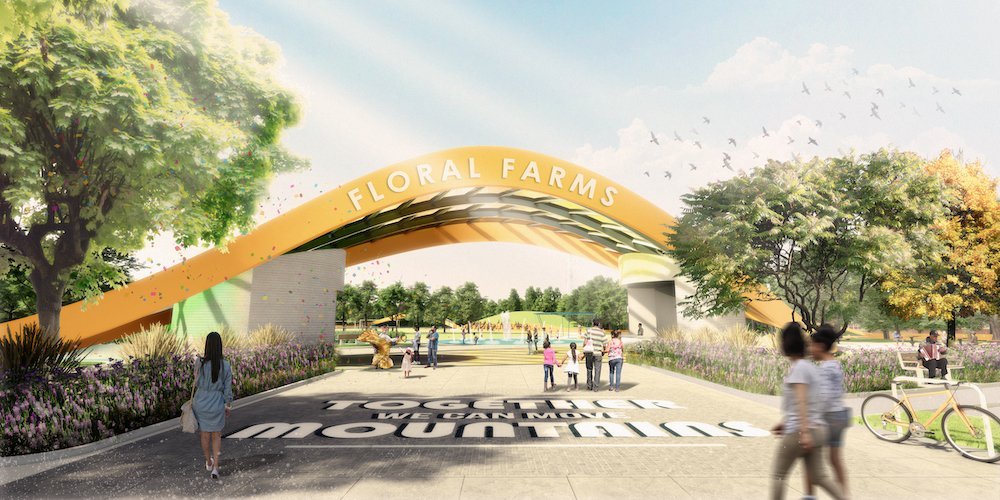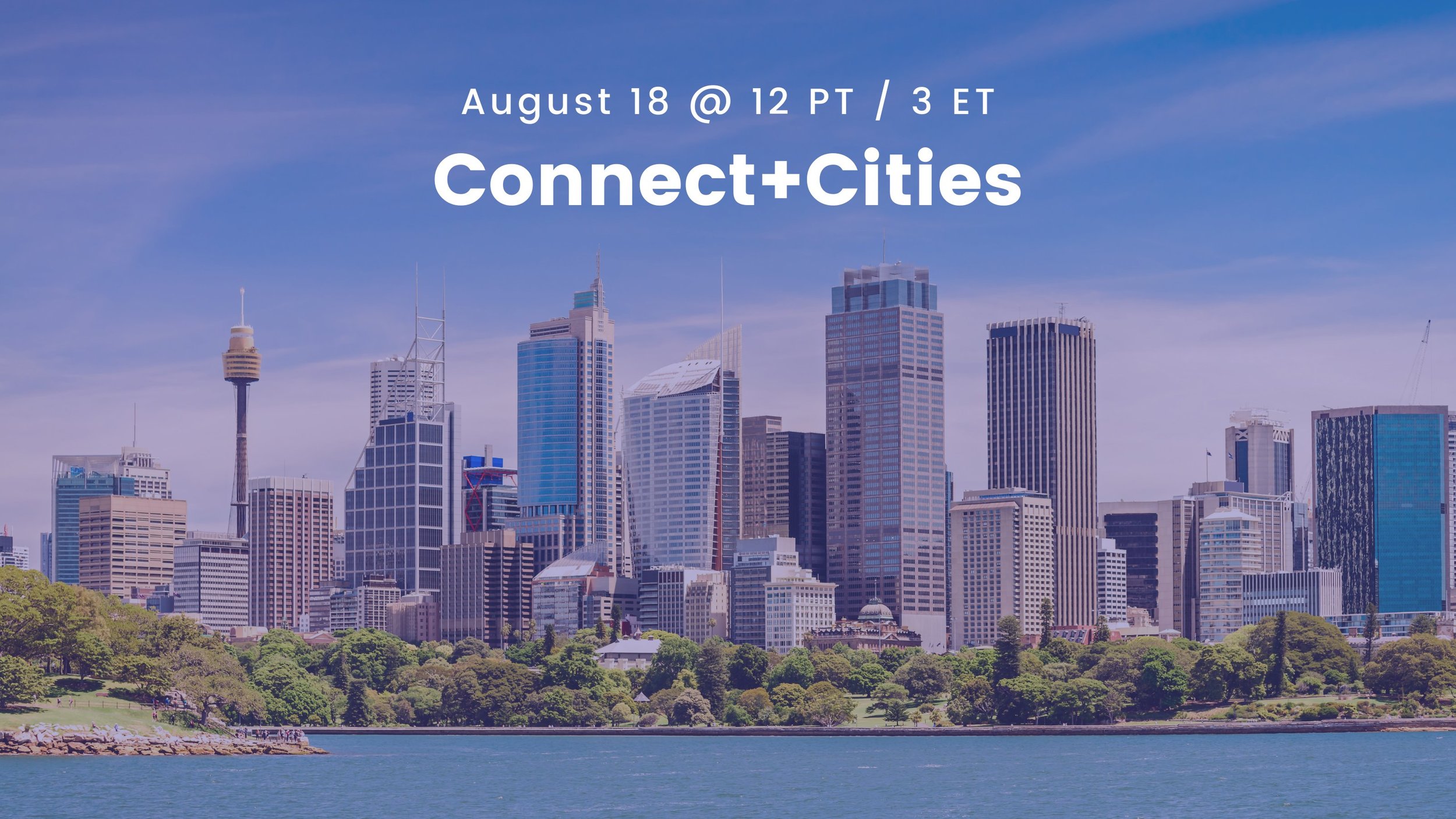Fast Company World Changing Ideas!
Park for Floral Farms won honorable mention in the general excellence category of Fast Company’s World Changing Ideas Awards honors the broadest ideas, whether they’re new government policies, new business models, or entirely new consumer categories. Anything that has the potential to effect true systems change or solve wicked problems.
Well-Being & Mental Health by Design
How a shift in attitudes about mental health is changing not only how we design for well-being, but also the inner workings of the architecture field itself.
Bloomberg features environmental justice effort behind Park for Floral Farms
“What I feel, and what the community feels, is we should have as much justice and freedom, and breathe clean air, like the other areas of Dallas,” Jackson says. “The city isn’t taking lower-income brown and Black families and their health into consideration.”
How will the Floral Farms neighborhood heal after Shingle Mountain?
"Poisoned by Zip Code, Mended by Design" featured (from left) Miguel Perez, KERA arts reporter; Ari Brielle, artist; Marsha Jackson, activist and Floral Farms resident; Erin Peavey, architect, HKS and Evelyn Mayo, chair of Downwinders at Risk. Here on stage at the Dallas Museum of Art
State of the Arts: Poisoned by Zip Code, Mended by Design
For years, a giant pile of hazardous waste plagued the Dallas neighborhood of Floral Farms. The notorious Shingle Mountain is gone now, but what happens next?
In our latest State of the Arts conversation, join KERA Arts Reporter Miguel Perez in conversation with artist Ari Brielle, community activist Marsha Jackson, Erin Peavey, architect with HKS and Evelyn Mayo of Downwinders at Risk.
State of the Arts: Poisoned by Zip Code, Mended by Design is an in-person event on Saturday, March 5, at the Dallas Museum of Art. Register for the free conversation here. Can't make it in person? The event will be also be live-streamed on the DMA's YouTube channel.
Rethinking The Future Award
The story of the Floral Farms Park is one of reclamation, connection, and healing. It’s not just about the removing an illegal dumping site, where a mountain of shingles grew to be six-stories tall— it’s about reclaiming the identity of a vibrant neighborhood that came to be known as “where Shingle Mountain is”.
The Work of Rest: Psychology Today
Rest is essential to keeping one's mind and body fertile, creative, and well. Here’s my personal and scientific journey of investing in rest.
The Ties That Bind: Why Social Networks Matter
Each of our childhoods is buried in our work in different ways. For me, it is my love of problem-solving through storytelling and narratives. For Dr. Mario Luis Small, it's his stories of growing up in Panama in a tight-knit family with an architect father—these aspects shine through in his seminal work on social networks.
I recently had Dr. Small on the Shared Space podcast, where he discussed what social capital is and why it is important to everything from getting a job, to staying healthy, to keeping kids in school; the role of local organizations and institutions—childcare centers, libraries, barbershops—in fostering connection; and research-informed strategies for how the built environment can foster—or harm—our connections…
Floral Farms Park Wins Urban Design Unbuilt Award
Park for Floral Farms is the collective vision of the Floral Farms residents to fight against environmental injustice on the former Shingle Mountains site. Through co-planned and co-led community engagement sessions with the neighbors, the design team listened to their vision. It helped them give physical form to their dream of turning this former toxic waste site into a beautiful community park. Soccer fields, walking trails, a community garden, trees, and a splash pad were high on the list for programmatic needs. Flower beds dot the site and mark the entry as a way of reclaiming their Floral Farms’ identity.
Campaign to End Loneliness: Beyond COVID-19
How does where we live impact on how we experience loneliness and what can we as policymakers, researchers, and practitioners do about it. This session which includes speakers with experience from around the world, will look at what interventions can really make a difference in reducing the impact of where we live on our levels of loneliness.
KERA NPR: ‘Southeast Dallas residents envision a park at former Shingle Mountain site’
The new park would replace the vacant lot of about 4 acres, where the notorious Shingle Mountain once stood. Shingle Mountain was the 100,000-ton pile of hazardous waste that loomed over the community for three years. Residents said it “stood as a vivid reminder of their worth to the city.”
Dallas Morning News: ‘A place of community and healing’
‘A place of community and healing’: This Dallas architect led park design for Shingle Mountain site .
‘Together we can move mountains’ is the motto of the park — and of Erin Peavey’s effort to ensure that the Floral Farms neighborhood got the proposal it envisioned.
Hope Comes to Floral Farms: Visions of a Park Where Shingle Mountain Once
“Peavey says she hopes the park project channels some of what made the neighborhood great and provides a place for the residents to be together. That’s where the idea for the community garden came from. The community was also desperate for a soccer field; HKS hopes it will attract teams from across the city while giving the neighborhood somewhere local to play. The second phase of the park will include an equine therapy center, using an existing building on the property.”
Connect + Cities: Foundation for Social Connection and Social Health Labs
Join us for the third event in the Connect+Conversations series! This session will focus on how the places where we live, work, and play influence our social relationships.
We will explore the latest research, recommendations, and real-world examples of designing the built environment and neighborhoods to reduce loneliness and strengthen communities.
You will hear from experts in this space and have the opportunity to engage with people across the US and globally. Join the conversation if you are interested in learning and discussing:
What features of the built environment contribute to social health
How urban vs. rural communities help or hinder social connection
Why design and programming must go hand-in-hand
And more!
Psychology Today: Olympic Proportions
Struggling to balance it all? How to listen to your inner voice and redefine your worth.
Alone Together Podcast
Following the pandemic of 1918, there was an urge to look for new solutions to what we used every day inside our homes. Everything from door knobs to bed frames to toilet seats were redesigned towards a cleaner, more hygienic environment. What will the interiors of houses look like after this pandemic and how and where will we live? Whether it’s a basement suite or a mansion by the beach, our homes are shelters and sanctuaries. But sanctuaries come at a cost. House prices skyrocketed during the pandemic and so did loneliness. It may be scary to go back outside after this pandemic, but greenspace and third places connect us with each other after months of isolation. In this episode, hear from: Uwe Schmidt-Hess, the founder and director of 'Patalab. Since setting up the practice in 2008, he has coordinated the design of a diverse range of projects encompassing the residential, public, office, arts and culture sectors. Prior to establishing Patalab, Uwe worked for several leading international firms including Fink+jocher in Munich, Atrium Design in Bangkok and Make Architects in London. Erin Peavey, an Architect and Design Researcher at HKS. She bridges the gap between research and practice, with a focus on design for health and wellbeing. Erin has been named a Rising Star by Healthcare Design Magazine and Healthcare Design's Best Under 40 by the AIA-AAH. If you like this episode, please subscribe here: https://apostrophepodcasts.ca/alonetogether and follow us on social media @apostrophepod See acast.com/privacy for privacy and opt-out information.
Visible Voices Podcast
I was honored to be in conversation with Jennifer Roberts, PhD and Resa Lewiss, MD on her podcast, Visible Voices talking about the role of the built environment on health.
Psychology Today: Designing for Happiness
Loneliness and social isolation are threatening millions of people; however, increasing connection can reduce risk.
The places we live can exacerbate our sense of isolation and loneliness.
Concrete design strategies—like universal accessibility, incorporation of nature, and shared spaces—can foster social health.
Psychology Today: Is Your Environment Making You Lonely?
Loneliness and social isolation are threatening millions of people; however, increasing connection can reduce risk.
The places we live can exacerbate our sense of isolation and loneliness.
Concrete design strategies—like universal accessibility, incorporation of nature, and shared spaces—can foster social health.



















